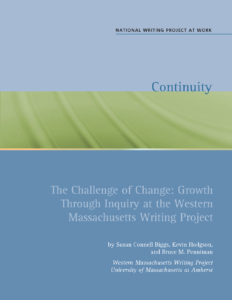Author: Susan Connell Biggs, Kevin Hodgson, and Bruce Penniman
Summary: This National Writing Project monograph describes the inquiry process undertaken by leaders at the Western Massachusetts Writing Project when the site faced radical changes and challenges in funding and leadership. This process led to a reorganization of the site, with new structures created to ensure its sustainability. In addition to the narrative, the monograph includes a variety of useful resources and tools for engaging in collaborative planning such as identity mapping, inquiry models, site leadership job descriptions, and more.
Original Date of Publication: 2008
Excerpt
The possibility of future challenges is always imminent: changes to the student and teacher population in the service area, increases in state requirements for teachers, decreases in school budgets; and the greatest of them, probably, are the unanticipated turns in people’s lives. A leadership structure, after all, isn’t a diagram on paper but a network of people working together. And real people get sick, suffer losses, change jobs, and move away. No organization is ever really “prepared” for such changes, but it is possible to have processes in place—habits of mind, perhaps—that make such changes less wrenching and more survivable.
Sites can reap both planned and unplanned benefits from taking stock. For example, inquiry as an ongoing stance coupled with long-term planning and anticipation of changes not only helped WMWP to determine next steps but had the added benefit of creating more leadership channels. Additional leadership positions alone, however, are not the answer to creating a sustainable site. The positions need to be coupled with mentoring and a rotation plan. Utilizing visual aids such as the site maps provides a tangible method of ensuring that all of the site’s three components— summer institute, continuity, and inservice—are being attended to. Thinking through the representation of the site’s Web presence helped WMWP realize that it needs to address a range of audiences, from classroom teachers to administrators to the general public. All of these audiences contribute to the sustainability of the site. Recognizing and addressing their needs and expectations remain ongoing challenges. Awareness of the interests and needs of the various stakeholders in the service area will, undoubtedly, also be an impetus for strategic planning at the site.
Related Resources
- Building the Capacity of Writing Project Site Leadership
- Visioning Retreats as a Strategy for Leadership Development and Site Development
- Leadership Transition: Taking Over a Site in Reorganization
Original Source: National Writing Project, http://www.nwp.org/cs/public/print/resource/2721
